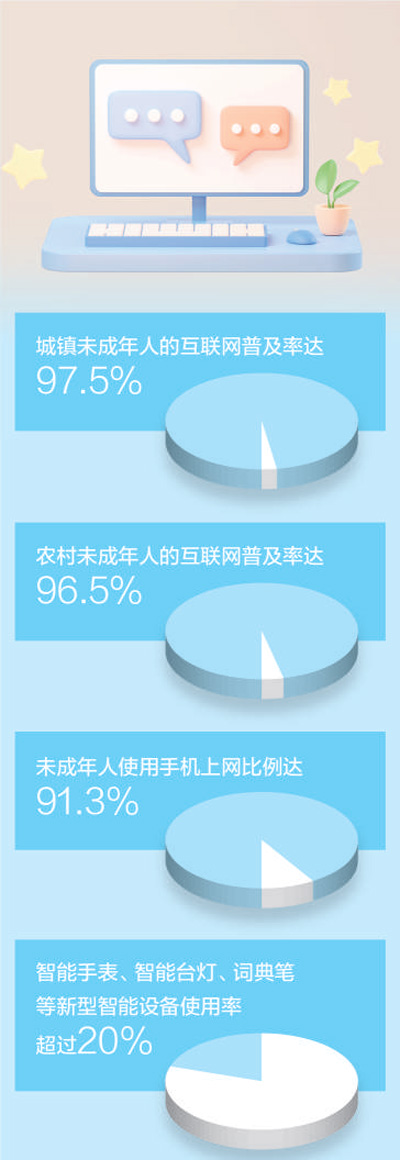 |
Data source: The 5th National Survey Report on Internet Use of Minors
Drawn by: Cai Huawei |
Core reading
The age of first access to the Internet is getting younger and younger, and the number of minor Internet users continues to expand... The survey shows that the current number of minor Internet users in China is 193 million, and the Internet penetration rate of minors is 97.2%. It is the common responsibility of the government, schools, families and society to create a network environment conducive to the physical and mental health of minors. The promulgation and implementation of the Regulations on the Protection of Minors' Networks provides a better institutional guarantee.
The Internet is fully integrated into learning and life. While minors have more convenient access to knowledge and information, they also face risks such as bad information dissemination. The Regulations on the Protection of Minors' Networks (hereinafter referred to as the Regulations) was officially implemented on January 1 this year, providing a better institutional guarantee for creating a network environment conducive to the physical and mental health of minors.
Now the Regulations have been implemented for half a year. In the past six months, what are the new manifestations of the network disorder involving minors, and how to improve the efficiency of supervision and law enforcement in a targeted way? How can all parties implement relevant requirements to protect children's access to the Internet? The reporter conducted an interview.
Minors need to be guarded by all parties when surfing the Internet
Sun Jie (a pseudonym), a Beijing citizen, found that his son, who was in primary school, always secretly used his mobile phone to "brush" short videos in the middle of the night. "I clearly set up the youth mode. After 10 p.m., parents need to input their passwords to log in. How can I still play?"
Sun Jie discovered the truth by observing secretly. "Even if the youth mode is used, children can avoid the youth mode as long as they exit the current account and re register a new account with another mobile phone number." Sun Jie said, "I think there are loopholes in this youth mode, and it is difficult to strictly prevent minors from indulging."
The spread of bad information, addiction to short videos and games, online fraud, and theft of personal information... For a long time, Internet chaos involving minors has been a concern. Among them, the platform protection measures are not strict and reasonable enough, which is an important source of network risk for minors.
Previously, the National Internet Information Office publicly solicited opinions on the Guidelines for the Construction of Mobile Internet Juvenile Mode (Draft for Comments), which requires that after entering the juvenile mode, the mobile intelligent terminal should be verified and confirmed by parents before performing operations such as exiting the juvenile mode or restoring factory settings. "The platform should set up a more reasonable and rigorous minors model to prevent measures from becoming formalistic," said Yu Xukun, executive director of the Beijing Youth Legal Aid and Research Center. The Regulations also require network products and service providers to timely modify the content, functions and rules that may cause minors to become addicted, and to publish the anti addiction work to the society every year to accept social supervision.
The network literacy of guardians is also crucial. According to the Fifth National Survey Report on Internet Use of Minors, 28.7% of parents said they did not know much about the Internet, and their main online behavior was watching news or short videos; In addition, 7.8% of parents said they would not access the Internet.
"About 1/4 of parents believe that they rely on the Internet, which may have an impact on their management of their children's online behavior." Tong Lihua, director of the Beijing Youth Legal Aid and Research Center, said that some guardians' own network literacy is not high enough, exacerbating the problems related to minors' Internet access.
In addition, technological progress has also brought risks to the network protection of minors. Wang Xiao, the product manager of a short video platform in charge of content security, said that the rapid development of generative artificial intelligence and other technologies has also brought the risk of spreading bad information to minors. Taking some "secret chat software" and AI mapping software as examples, ordinary monitoring methods sometimes fail to work.
Targeted improvement of supervision and law enforcement efficiency
In 2023, a judgment of a court in Shanghai caused social concern: a game agent training app encouraged users including minors to conduct commercial and large-scale agent training transactions through its platform in the form of "cash back for issuing orders" and setting up a "special zone", and was finally sentenced by the court to unfair competition.
Among them, the court specifically pointed out that the agent training APP has destroyed the anti addiction mechanism for minors, and minors can enter the game system through accepting agent training orders without being restricted by the time period and duration, increasing the risk of minors indulging in games and seriously affecting their physical and mental health.
"In this case, we made a pre litigation injunction, and the respondent stopped acting at that time. This shows a clear attitude towards protecting the healthy growth of minors." The relevant person in charge of the Intellectual Property Division of the Court introduced.
At present, China has established a system of laws and regulations, including network security law, minors protection law, minors network protection regulations, children's personal information network protection regulations, etc., to protect the legitimate rights and interests of minors in cyberspace in a multi-level and multi-dimensional manner. Taking the "game practice" involved in the case as an example, the Regulations clearly require that online game service providers should verify the real identity information of minors through a unified online game electronic identity authentication system and other necessary means.
However, the network disorder that endangers the physical and mental health of minors is constantly emerging in new forms, which puts forward new topics for supervision.
"The governance of bad information is gradually optimized and improved, but the content and transmission channels of such information are characterized by constant iteration, fission and rapid change, especially in the relatively hidden social environment such as minor communities and groups, forming some subcultural forms and trends." Lin Wei, president of Southwest University of Political Science and Law, suggested that, Turn the focus of governance from specific information content to the overall ecological atmosphere.
In this regard, Liu Xiaochun, Executive Director of the Internet Rule of Law Research Center of the University of the Chinese Academy of Social Sciences, suggested that the regulatory authorities' requirements for the Internet platform should shift from the simple negative information elimination mode to the guidance and shaping of the positive atmosphere of the community, and control and guide the community atmosphere with obvious negative guidance through platform rules, community conventions and other ways.
The network platform must bear self-discipline responsibility
Recently, many platforms are stepping up to upgrade and improve the youth model and the minors model: quickly formed a minors privacy protection model that includes eight functions, such as restricting minors' private messages, restricting strangers from paying attention to minors, and hiding minors' geographical location; Watermelon video will force users under 14 years old to enter the youth mode from 2024.
"The network platform is the first person responsible for the management of information content." Wang Zhenhui, a professor at China University of Political Science and Law, said that the Internet platform should do a good job of internal self-discipline, implement the relevant requirements of the Regulations on the minors' model, and strictly crack down on the content and acts that infringe the legitimate rights and interests of minors.
"If we only rely on the minors' model, it is not a long-term solution for the cultivation of network literacy. Minors need to gradually adapt to the real network ecology in the growth process, and education guidance needs to 'teach them to fish'." Lin Wei said.
Experts suggest that the Internet platform should bear the responsibility of self-discipline. On the one hand, it should actively purify the content of the whole platform, and on the other hand, it should improve protection measures, so that young people can be helped in a timely manner when they are injured, and can safely touch the online world.
"We have fully understood your situation, and now we need to verify the relevant information. If the situation is true, the corresponding consumption will be returned to your account." At Tencent Juvenile Guard Camp in Chengdu, Sichuan, the staff is communicating with a juvenile user who is suspected of being defrauded by telephone, and also promptly notified the relevant departments of possible illegal clues. Through the national service hotline and minor parents' service platform applet, the camp provides users with a refund channel to apply for minors' irrational consumption, and sets up a special group to accept minors' comprehensive network problems.
Jointly play the positive role of the Internet
"In addition to risk prevention ideas, we should also see the positive enabling value of the network for the self-development and education of minors," Liu Xiaochun said.
Not long ago, a short popular science video of physics became popular on the Internet: on the mobile phone screen, a teacher held a "lightning rod" made of waste materials and pointed at the lamp hanging in the classroom. An arc appeared at the top of the "rod" and lit the lamp. In the cheers of the students, he began to explain the "Tesla coil" behind the phenomenon.
Xia Zhendong, a physics teacher in Jingdezhen, Jiangxi Province, released this video of "thunder and lightning rod", which won more than 2.2 million praise.
It is understood that last year, Tiao Yin, together with Popular Science China, launched a youth science creation plan to create a series of popular science videos suitable for young people to watch. This year, the Science and Technology Museum of China, the Publicity and Education Center of the Ministry of Education and Douyin also jointly launched the 2024 "Mobile Science Class" activity, organizing "Science Popularizers" to provide interesting science courses for primary and secondary school students in villages and towns.
In the nationwide digital literacy and skill improvement action carried out by departments such as Netcom, young people's digital literacy is also one of the priorities. In recent years, various network platforms have carried out theme activities to help the healthy development of minors with digital technology.
In this regard, Wang Weiliang, a professor of Shandong University of Political Science and Law, said that the Regulations accept the relevant provisions of the Juvenile Protection Law and set up a special chapter to regulate the promotion of network literacy, which reflects the preventive protection concept of putting literacy promotion first. All parties shall further implement relevant requirements to promote the improvement of minors' network literacy.
In addition to the platform and regulatory authorities, parents and schools are also very important in guiding minors to use the Internet in a healthy way. "The government, enterprises, families, schools, social organizations and so on should all participate in, and only the joint efforts of all parties can effectively solve the problem." Tong Lihua said.
People's Daily (June 13, 2024, Version 07)
(Editor in charge: Hao Mengjia, Li Fang)
Share to let more people see





































